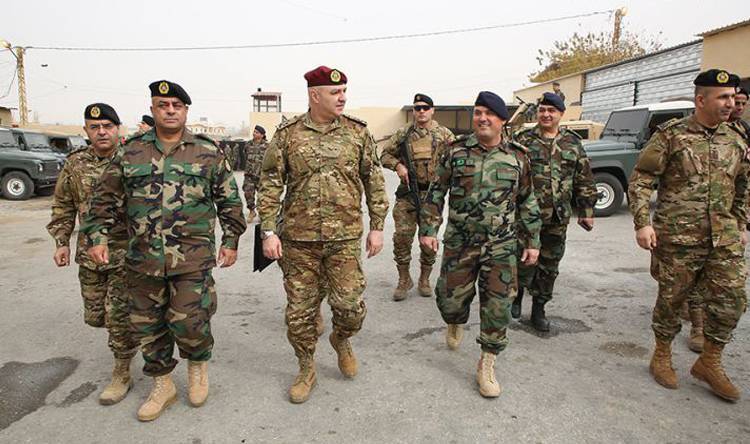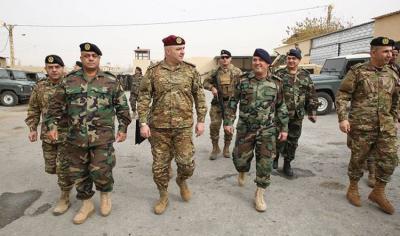The issue of the worsening waves of Syrian infiltration and displacement came to the forefront during two Cabinet meetings. The first meeting, held in the morning, did not have enough members present and turned into a consultative session. The second meeting, held in the afternoon, did have a quorum and was dominated by this issue, despite it initially being scheduled to continue discussing next year's budget. The caretaker Prime Minister Najib Mikati expressed his regret in the morning session over the absence of certain ministers, saying, "It's a pity that the ministers who shout all day about this file were absent, just for the sake of political bidding." The consultative meeting concluded with a consensus to label the situation as an existential threat, based on statements made by Minister of Youth and Sports George Kallas, who conveyed serious comments from General Joseph Aoun, stating that "Lebanon faces an existential threat due to the Syrian refugee crisis." Kallas emphasized that "the responsibility is not solely on the government; all political leaders are responsible for developing a strategy for this crisis, otherwise, Lebanon is facing a constitutional danger." He also relayed alarming figures from Mikati, indicating that "15,000 refugees enter Lebanon monthly, and if this pace continues, it equates to 180,000 refugees annually, which is a large and dangerous number."
Moreover, "Al-Akhbar" pointed out that the phrase "existential threat," which was echoed by security officials during the consultative meeting held yesterday at Mikati's office, summarizes the concerns raised by developments in Syrian displacement, amid a new wave of refugees that has been flooding into Lebanon through land routes and illegal crossings for over two months. A government meeting was scheduled for yesterday morning to involve security leaders in discussing the displacement issue, but attendance was not met as Ministers Amin Salam, Walid Nassar, Nasser Yassin, Abbas Haj Hassan, and Hektor Hajj were absent, so a consultative meeting with 14 ministers and the security leaders was held instead. Each of the security leaders presented the data available to them, stressing that "the approach to this new wave of displacement must be different this time," indicating it shouldn't be addressed from a political rivalry standpoint.
Despite linking the new wave of displacement to the severe economic blockade on Syria, the efforts to obtain financial and material assistance from international organizations, and Lebanon being used as a transit route for illegal migration to Europe, the data available to the security agencies confirms that "the majority of refugees are from the youth age group, coming individually without their families, and are spreading across various regions." Additionally, there have been "intensive activities of smuggling networks at the borders, some of which are run by current deputies."
According to ministerial sources, security leaders emphasized that the refugee issue can no longer bear the luxury of political divisions and requires exceptional measures, reminding that the state "mismanaged the issue from the onset of the refugees' entry in 2011, leading to a severe underestimation of the consequences," including halting the registration of refugees and internal and external pressures preventing the execution of certain decisions, including a 2019 Supreme Defense Council decision to stop any refugee who enters illegally, in addition to using refugees as a grassroots support base for the opposition and attempting to leverage them in the democratic process to overthrow the Syrian regime.
Ministerial sources reported that Army Commander General Joseph Aoun indicated that "8,000 Syrians entered Lebanon recently, with 95% being from the youth category." He noted that he was "very upset," stating that "smuggling across the borders has become an existential threat, and we can no longer bear it. We might have to engage with them or tell the army: provoke them to attack you, so we have an excuse to kill them legally, despite our limited numbers." In response, Minister of Culture Muhammad Mortada said: "Don't worry about the law; do what needs to be done." Meanwhile, Secretary-General of the Cabinet Judge Mahmoud Makiyeh commented, "If you want to respect the text of the law, you must declare a state of emergency in the border regions and take the measures you want, because then the army can deploy and control the crossings." Aoun replied, "I have 3,000 soldiers for emergencies, but I need 40,000 to secure the borders." Education Minister Abbas Halabi proposed organizing a media campaign about the risks of displacement on Lebanon and Syria, "provided that political refugees are not returned, and to prevent racist reactions."
For his part, the acting General Directorate of General Security Director Major General Elias Bissar presented "a strategic plan with multiple axes," including addressing political, economic, humanitarian, and governance levels, explaining the measures and procedures to be taken against refugees to prevent them from becoming a threat. He asserted that "the issue cannot be solved without coordination among the various concerned parties domestically first, and then with the Syrian state and subsequently with the international community, as it is not enough for Lebanon to continue lamenting its inability to bear the consequences of displacement alone."
In the afternoon, a second session of the Cabinet was held to follow up on the 2023 budget and included further discussions on the refugee issue. Based on the data presented by security leaders, the Cabinet requested that relevant ministries and departments handle the file within their respective jurisdictions, notably: fostering cooperation and coordination among security and military agencies to enhance measures taken, especially by the army's border regiments and all border posts, in addition to strengthening checkpoints on routes used by infiltrators and carrying out comprehensive coordinated operations targeting smuggling networks, shutting down illegal crossings, and seizing means and funds used by traffickers lawfully. This should coincide with extensive media coverage and increased intelligence and security efforts to secure both land and maritime borders while preventing the illegal entry of Syrians and taking immediate action against them for their repatriation.
The Cabinet also decided to circulate a directive to municipalities requiring them to immediately report any suspicious movements and gatherings related to Syrians, especially regarding their smuggling, conducting an immediate survey of Syrian refugees residing in their jurisdictions, and compiling a database on them. They instructed all associations, especially foreign ones, to coordinate with ministries, departments, and military and security agencies, under the threat of withdrawing their licenses, and emphasized the need to take legal actions against institutions and companies operating in Lebanon that violate labor laws. They also resolved to prepare necessary legal amendments, in coordination with the General Directorate of General Security, to increase fees on foreign labor in anticipation of including these adjustments in the 2024 budget currently under discussion. Additionally, the Cabinet decided to intensify diplomatic efforts to explain the severity of this issue for Lebanon and regional and European security, particularly in light of limited capabilities to control smuggling operations across Lebanese territory and waters.
The Council decided to form a ministerial committee to visit Damascus, chaired by Foreign Minister Abdullah Bou Habib, to follow up on the file. It is noteworthy that this decision had previously been stalled by disagreements among ministers over the management of the file, prompting the foreign minister to withdraw from leading it. The conflict resurfaced yesterday when Minister of Displaced Persons Issam Sharafeddine expressed his objection to the decision, due to "its failure to meet the required criteria," requesting the inclusion of specialist ministers knowledgeable about the file. Mikati then proposed giving Bou Habib a 15-day opportunity. At that point, Sharafeddine suggested putting the issue to a vote, which Mikati rejected, prompting the Minister of Displaced Persons to exit the session, deeming the "decision weak and poorly thought out."




